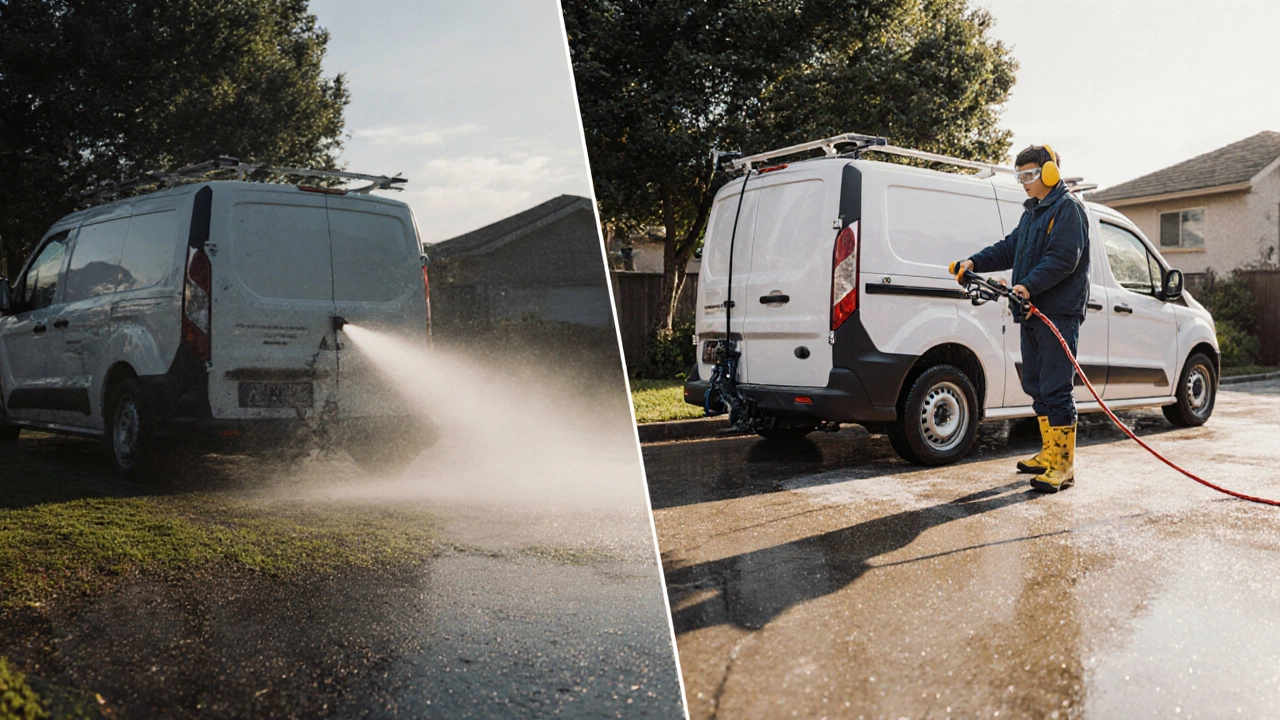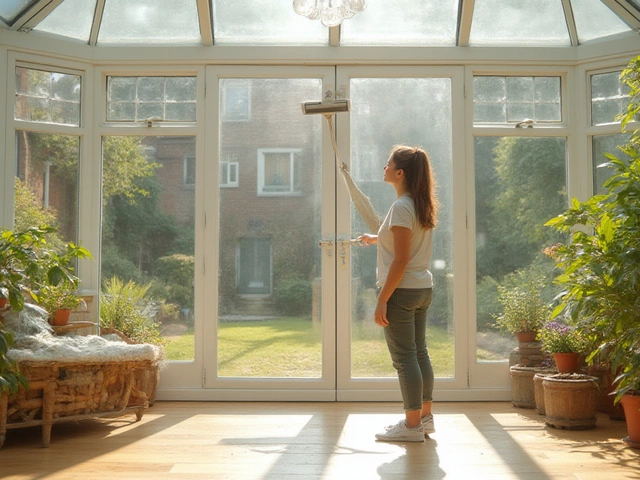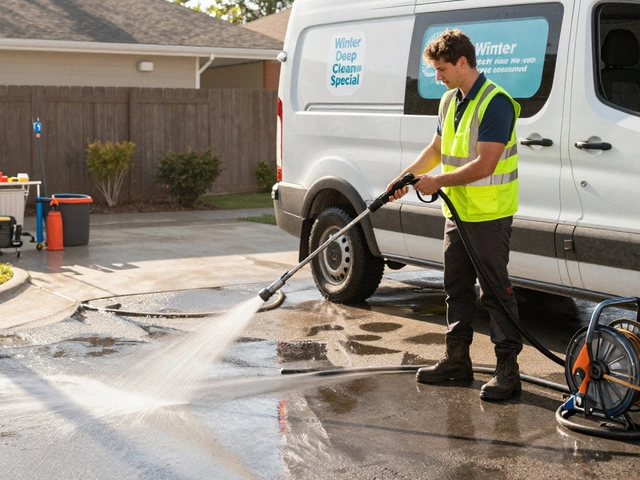Pressure Washing Business Starter Kit
Select Your Business Type
Equipment Needs
Legal Requirements
Estimated Startup Costs
Click "Calculate Startup Costs" to see your estimated investment.
Equipment Comparison Table
| Type | Typical PSI | Flow (GPM) | Best For | Approx. Cost (GBP) |
|---|---|---|---|---|
| Electric | 1,500–2,500 | 1.2–1.8 | Residential decks, patios, cars | £300–£800 |
| Gas-Powered | 2,500–4,000 | 2.0–3.0 | Small commercial jobs, driveways | £800–£1,500 |
| Diesel-Driven | 4,000–6,000 | 3.5–5.0 | Large commercial contracts, industrial cleaning | £1,500–£3,000 |
Quick Takeaways
- Pick the right power washer (electric, gas or diesel) based on jobs you’ll chase.
- Secure a business licence, insurance and any local water‑use permits before you hit the road.
- Invest in a reliable service vehicle and safety gear - they protect you and your reputation.
- Set clear pricing (per‑hour, per‑square‑foot or package) and track expenses from day one.
- Market locally with a simple website, Google My Business and a handful of flyers.
When you hear “pressure washing business”, you probably picture a truck blasting grime off driveways. Turning that image into a profitable venture isn’t magic - it’s a series of practical decisions. Below you’ll find the exact checklist that turns curiosity into cash, from the first screwdriver in your garage to the first recurring contract on your calendar.
What Exactly Is a Pressure Washing Business?
A pressure washing business offers high‑pressure water cleaning services for homes, commercial properties, vehicles and industrial equipment. The core value is speed: you can strip paint, remove moss, and clean concrete in minutes rather than hours. Because the service is visual - clients see the before‑and‑after instantly - word‑of‑mouth spreads fast, making it a sweet starter‑up for entrepreneurs who like to work outdoors.
Essential Equipment: Choose the Right Power Washer
The heart of the operation is the Power Washer. Picking the right model determines which jobs you can take and how much profit you keep. Below is a quick comparison of the three main types you’ll encounter.
| Type | Typical PSI | Flow (GPM) | Best For | Approx. Cost (GBP) |
|---|---|---|---|---|
| Electric | 1,500‑2,500 | 1.2‑1.8 | Residential decks, patios, cars | £300‑£800 |
| Gas‑Powered | 2,500‑4,000 | 2.0‑3.0 | Small commercial jobs, driveways | £800‑£1,500 |
| Diesel‑Driven | 4,000‑6,000 | 3.5‑5.0 | Large commercial contracts, industrial cleaning | £1,500‑£3,000 |
Most newcomers start with a solid gas‑powered unit - it gives enough power for driveways and small commercial contracts without the weight and fuel costs of diesel. Keep a spare hose, nozzle set and a basic pump filter kit; those accessories are cheap but save you hours of downtime.
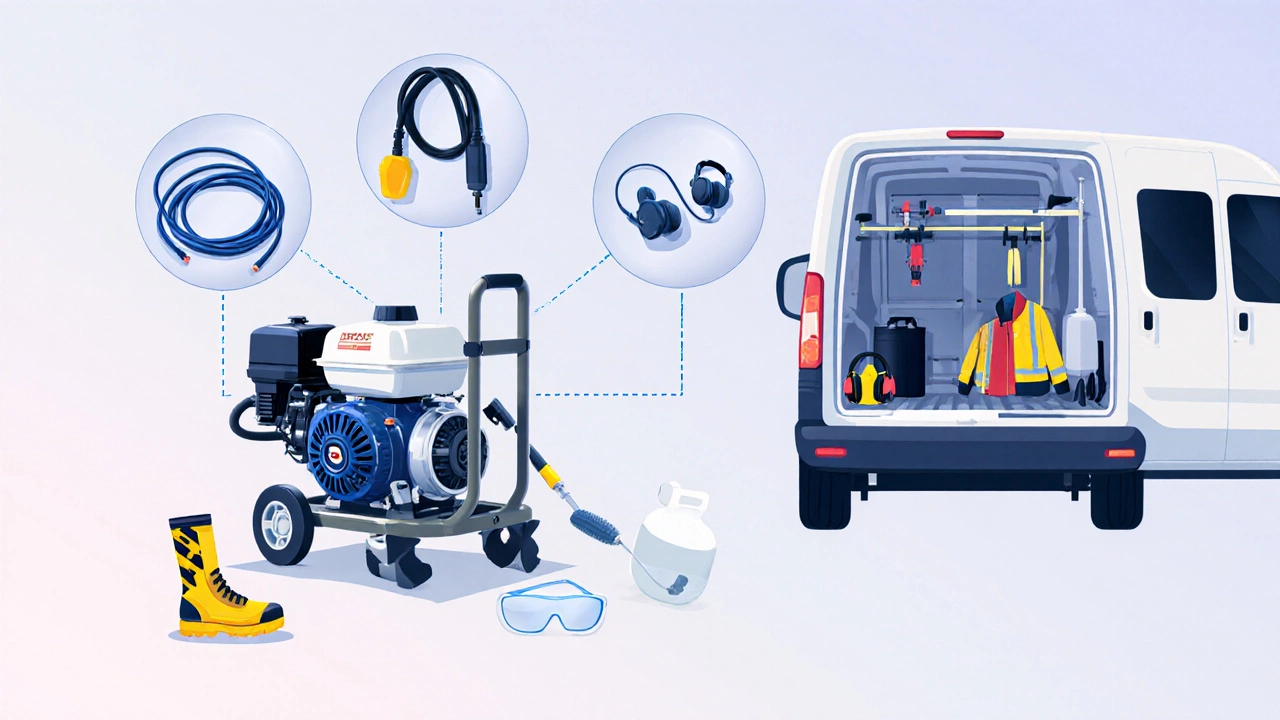
Legal & Financial Foundations
Before you crank the engine, you need three paperwork pieces out of the way:
- Business Licence - Register as a sole trader or limited company with Companies House. For a small operation, a sole trader registration costs about £12 and takes a day.
- Insurance - Public liability (minimum £2million) protects you if water damages a client’s property. Expect a yearly premium of £300‑£600, depending on coverage.
- Water‑Use Permit - Many UK councils restrict large‑volume water discharge. Call your local authority; a simple registration often costs under £50.
Open a business bank account, set aside a reserve for tax (about 20% of profit), and adopt simple accounting software like Wave or Xero to track every invoice.
Mobility: The Right Vehicle and Safety Gear
A reliable Vehicle is more than a van - it’s your mobile showroom. Choose a midsize panel van with a payload capacity of at least 1,000kg. Install a secure mounting bracket for the washer, a side‑door power outlet, and a water tank (150‑200L) if you’ll work in off‑site locations without a hose tap.
Don’t skimp on Safety Gear. A pair of anti‑slip boots, goggles, ear protection, and a pressure‑washing jacket keep you injury‑free and give clients confidence you’re a professional.
Marketing Your New Service
Even the best equipment won’t bring jobs if no one knows you exist. Here’s a three‑step Marketing Plan that works for local trades:
- Online Presence: Build a simple WordPress site (one page, contact form, before‑after gallery). Verify the business on Google My Business - it shows up in local “near me” searches instantly.
- Neighbourhood Outreach: Print ½‑page flyers and drop them at residential estates, garden centres, and estate agents. Offer a “first‑wash 10% off” coupon to convert curiosity into a trial.
- Partnerships: Talk to local landscapers, roofing firms, and property managers. Offer them a commission for referrals; recurring contracts from these partners are the gold standard.
Track every lead in a spreadsheet - note the source, date, and conversion rate. After a month, cut the tactics that aren’t delivering.
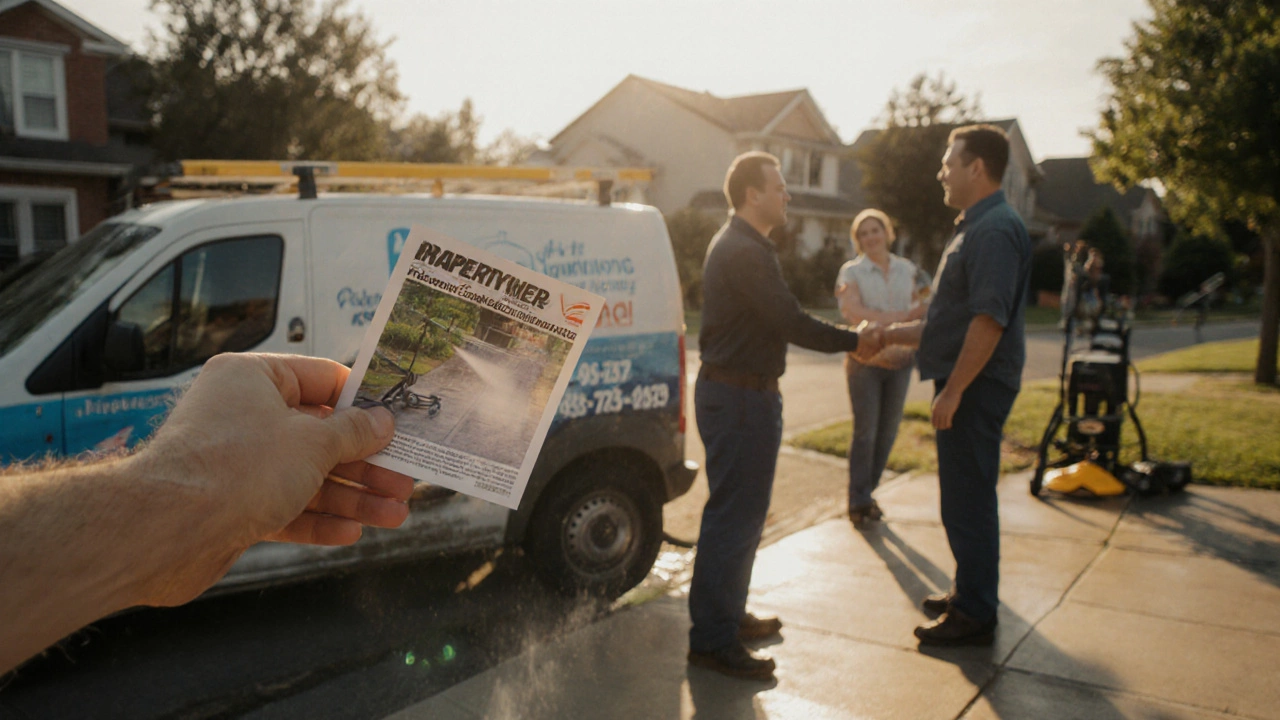
Pricing and Profitability
A clear Pricing Model helps you quote fast and avoid losing money. Most UK pressure washers charge either per‑hour (£45‑£75) or per‑square‑foot (£0.30‑£0.60). For residential driveways, a common package looks like this:
- Driveway (up to 30m²) - £80 flat fee.
- Patio + Fence - £120 flat fee.
- Full‑House Exterior - £250‑£350 depending on size.
Calculate your cost per job: fuel (£5‑£10), water (£0.10 per 100L), wear‑and‑tear on the washer (£2‑£4), and labour (your hourly rate). Subtract those from the quoted price, and you’ll see a healthy margin of 40‑60% on most jobs.
Common Pitfalls & Pro Tips
Even seasoned cleaners run into snags. Here are the top five and how to dodge them:
- Under‑estimating Water Use - Some councils cap discharge at 500L per hour. Carry a portable water recovery tank or schedule jobs when you have a nearby drainage point.
- Skipping Maintenance - A clogged pump can cost £150 in repairs. Flush the system after each job and replace O‑rings quarterly.
- Low‑balling Quotes - Early on, you may want to attract customers, but charging below cost kills cash flow. Offer a discount, not a loss leader.
- Neglecting Safety Training - Pressure water can cut skin at 2,500psi. Take a short Health and Safety course (often free via local councils) and keep a first‑aid kit in your van.
- Forgetting Follow‑up - A simple thank‑you email with a request for a review can boost your Google rating. Higher ratings mean more organic leads.
Next Steps: Your 30‑Day Launch Checklist
Turn the advice above into action with this day‑by‑day plan.
- Day 1‑3: Register the business, open a bank account, and purchase public liability insurance.
- Day 4‑7: Buy a gas‑powered power washer, safety gear, and a used panel van; install mounting brackets.
- Day 8‑10: Set up a simple website, claim Google My Business, and design a flyer.
- Day 11‑15: Apply for any required water‑use permit and schedule a Health & Safety course.
- Day 16‑20: Run three trial jobs at a discounted rate in exchange for testimonials.
- Day 21‑30: Launch the flyer campaign, approach two local partners, and start tracking leads.
Stick to the timeline, adjust as you learn, and you’ll be pulling in steady cash before the first quarter ends.
Frequently Asked Questions
Do I need a special licence to operate a pressure washer in the UK?
No separate “pressure‑washer licence” exists, but you must register your business with Companies House, obtain public‑liability insurance, and, if you’ll discharge large volumes of water, get a water‑use permit from your local council.
Which type of power washer should a beginner buy?
For most entry‑level entrepreneurs, a gas‑powered unit (around 3,000psi, 2.5GPM) offers the best balance of power and mobility without the high fuel costs of diesel models.
How much should I charge per job?
Typical rates are £45‑£75 per hour or a flat fee based on surface area (£0.30‑£0.60 per square foot). Factor in fuel, water, wear‑and‑tear and your desired profit margin to set a final price.
Is water recycling required?
Many councils require you to collect runoff or use a low‑flow nozzle to stay within discharge limits. A portable recovery tank (200‑300L) solves the problem for most residential jobs.
Can I run the business part‑time?
Absolutely. Many owners start on weekends, reinvest profits, and scale to full‑time once they secure regular contracts. Just keep your bookkeeping separate to track part‑time income accurately.
